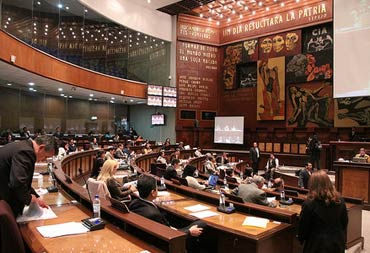Sweeping changes to Social Security program worry some members
Ecuador’s National Assembly voted overwhelmingly to make major changes to the country’s Social Security program (IESS) Wednesday morning. The changes include the elimination of a guaranteed 40% government contribution to the system’s budget. The changes were part of the Law of Labor and Justice, which also made changes to the country’s employment rules.

Ecuador’s National Assembly enacted major changes to country’s Social Security system early Wednesday morning.
Despite government assurances that IESS members will receive the same level of payments and service as they currently do, a number of workers groups say the change will weaken the system and could mean lower returns for retirees in the future.
In a prepared statement on Wednesday, President Rafael Correa charged that opponents of the changes are “fear mongering.”
“The IESS currently has a surplus of funds and does not need the 40% contribution,” Correa said. “Payments to retired people as well as all other services of the system, including health care, will not change. What this will do is force the system to work more efficiently and to eliminate waste. It means the system will become self-sufficient. Nothing will change for individual members.”
Earlier, other government officials said earlier IESS would continue to be backed by the government in case of emergency.
The new legislation does contain changes for retirees, however. It mandates that future increases in monthly payments will be adjusted by the rate of inflation, running at 3% to 4% annually in recent years. Under the old rules, increases could be as high 16% annually, based on a number of factors.
Other changes include: the voluntary inclusion of housewives into the Social Security system if they pay into the system; the elimination of fixed-term contracts for employees, in hopes of increasing the number of contributors to IESS; the inclusion of bonus payments, often referred as the 13th month, into monthly wages; and a requirement tying executives’ and managers’ pay to a percentage to that of low-wage employees.
Business organizations such as the Chamber of Small Businesses say the end of fixed-term employment contracts could lead to higher levels of unemployment. Patricia Velez, president of the Cuenca Chamber, say employers will be more reluctant to hire full-time employees. “Government rules already make it very difficult for employers to hire,” she says. “Eliminating worker contracts will make it even harder.”
Edison Lima, director of the Defense Front for Retired Persons, called the changes “unjust and illegal” and said they provide no guarantee that retirees will be paid in the future. “The 40% government contribution meant that IESS would be able to meet its obligations indefinitely into the future,” she said. “The new law means the financial stability of the system could change within a year,” she said.
Lima said her organization plans protests around the country against the new rules.
Despite the overwhelming vote on Wednesday, discomfort was expressed by some Pais Party assembly members about the IESS changes in meetings prior to the vote. They worried that supporting the changes could hurt Pais politically, including the chances of Correa’s re-election if he decides to run again.
Pais leaders, however, mandated the members vote in a bloc and said the bill was a “litmus test” of party loyalty. Nine number of Pais members were absent from the final vote.
Assembly members of the Avanza Party, which usually align themselves with Pais, refused to support the bill, saying it did not provide adequate assurances to retirees. Byron Pacheco of Avanza called the changes “patchwork,” and said IESS needs a comprehensive restructuring.





















